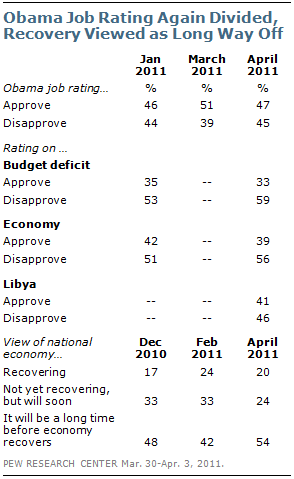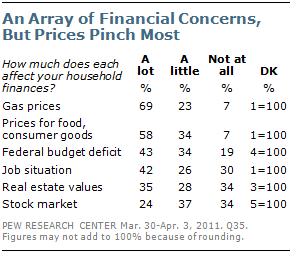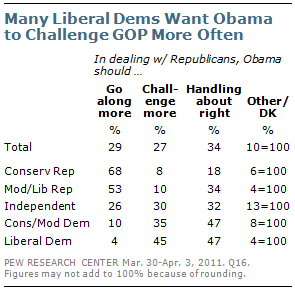With the public growing more anxious about the economy and concerned about overseas commitments, Barack Obama’s job rating has edged lower.

About as many now approve (47%) as disapprove (45%) of the way Obama is handling his job as president. In March, opinions about Obama’s job performance were more positive; 51% approved of his job performance and 39% disapproved. The current measure is similar to Obama’s ratings from last fall through early 2011.
On specific issues, Obama gets particularly negative ratings for his handling of the federal budget deficit (59% disapprove) and the overall economy (56% disapprove). He gets a mixed rating for his handling of the situation in Libya (41% approve, 46% disapprove). The survey also shows that an increasing number of Americans say the U.S. and its allies lack a clear goal in Libya. (See “Goal of Libyan Operation Less Clear to Public,” April 5.)
Despite recent signs of job growth, Americans are taking a more negative view of the national economy. The proportion rating economic conditions as “poor” has risen from 42% in February to 53% currently. Equally important, the public’s economic outlook has dimmed: 54% now say it will be a long time before the economy recovers, up 12 points from February. And there has been a rise in the percentage that expects their personal finances to get worse over the next year – from 26% in December to 33% currently.
The latest national survey by the Pew Research Center for the People & the Press, conducted March 30-April 3 among 1,507 adults, finds widespread concern about an array of financial problems – not just jobs, but also prices for gas and food.

Fully 69% say that gas prices affect their household’s financial situation a lot; 58% say the same about prices for food and consumer goods. By comparison, 42% say the job situation has a major impact on their personal financial situation; about as many (43%) say the federal budget deficit affects their personal financial situation a lot.
(Pew Research’s Weekly News Interest Index, released April 6, found that while the percentage of Americans who say they are hearing mostly bad news about the job situation has declined, more are hearing bad news about prices. )
With the showdown on federal spending looming, Obama’s job rating continues to be much higher than those of Republican or Democratic leaders in Congress. Just 30%

approve of the job that Republican leaders in Congress are doing while twice as many (61%) disapprove. The job rating for Democratic congressional leaders is equally dismal (31% approve, 60% disapprove).
However, while Obama continues to attract overwhelming support from the Democratic base, many Democrats – particularly liberals – say he should challenge congressional Republicans more often. Among the general public, 29% say he should go along with Republicans more often, 27% say he should challenge them more often, and 34% say he is handling this about right.
Liberal Democrats are divided – 47% say he is handling relations with congressional Republicans about right, but nearly as many (45%) want him to challenge Republicans more often. Conservative and moderate Democrats, on balance, say Obama is handling this about right. Republicans, not surprisingly, would like to see Obama go along with the GOP more often.
The Republican Party has an advantage in views of which party can better handle the budget deficit – 46% say the Republicans can do better, compared with 34% who choose the Democrats. The two parties continue to run about even on most other issues, including jobs and health care. However, the Democratic Party holds leads over the Republicans on such traits as concern for average people (by 22 points), willingness to work with opposition leaders (17 points) and ethical governance (nine points).
The budget debate on Capitol Hill has focused in part on the possible impact of deep reductions in government spending on the nation’s job situation. In a separate survey conducted last month (March 8-14), 41% said that major cuts in spending this year would not have much of an effect on the job situation. Among those who did see an impact, nearly twice as many said deep cuts would hurt, rather than help, the job situation (34% vs. 18%). Pluralities of independents (45%) and Republicans (41%) said that major spending reductions would not affect the job situation; Democrats were divided, with 39% saying deep cuts would hurt the job situation and 35% saying they would not have much of an impact.

The new survey finds that as the Republican-led House approaches the 100-day mark of its tenure, about as many Americans say they are unhappy (44%) as happy (43%) that the GOP won control of the House last November. Just a third (33%) say they are keeping their campaign promises while 52% say they are not.
Comparatively, the Republican-led House gets less positive marks than did the Democratic-led Congress in March 2007 and the GOP-led Congress in April 1995. In both of those cases, however, the parties took control of both the House and Senate; the GOP currently has a majority in the House but not the Senate.